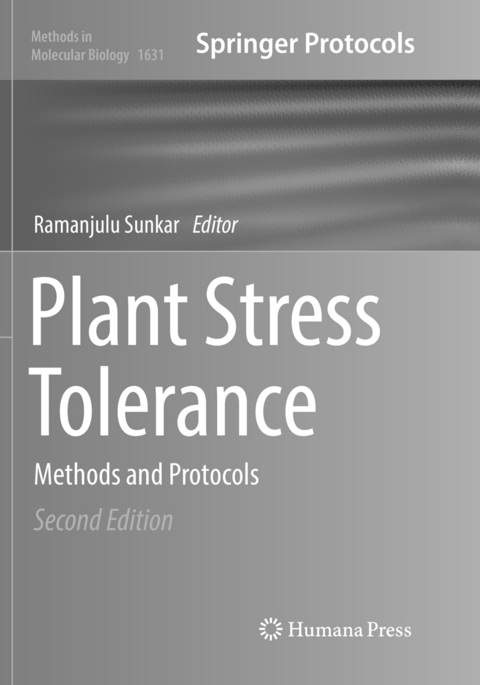
Plant Stress Tolerance
Humana Press Inc. (Verlag)
978-1-4939-8394-0 (ISBN)
Authoritative and practical, Plant Stress Tolerance: Methods and Protocols, Second Edition aims to ensure successful results in the further study of this vital field.
Epigenetics and RNA Processing: Connections to Drought, Salt and ABA?.- The Fundamental Role Of Reactive Oxygen Species In Stress Response.- Role of Long Non-coding RNAs on Plant Stress Tolerance.- Towards a Resilient, Functional Microbiome: Drought Tolerance-Alleviating Microbes for Sustainable Agriculture.- Mining and Quantifying In Vivo Molecular Interactions in Abiotic Stress Acclimation.- Generation of a Stress-inducible Luminescent Arabidopsis and Its Use in Genetic Screening for Stress-responsive Gene Deregulation Mutants.- Detection of Differential DNA Methylation under Stress Conditions using Bisulfite-Sequence Analysis.- ChIP-seq Analysis for Identifying Genome-wide Histone Modifications Associated With Stress-responsive Genes in Plants .- Isolation of Polysomal RNA for Analyzing Stress-Responsive Genes Regulated at the Translational Level in Plants.- Global Proteomic Profiling and Identification of Stress-Responsive Proteins using Two-dimensional Gel Electrophoresis.- Phosphoproteomics Analysis for Probing Plant Stress Tolerance.- Probing Posttranslational Redox Modifications.- Zymographic Method for Distinguishing Different Classes of Superoxide Dismutases in Plants.- Determination of Enzymes Associated with Sulfite Toxicity in Plants: Kinetic Assays For SO, APR, SiR and in-gel SiR Activity.- Determination of Total Sulfur, Sulfate, Sulfite, Thiosulfate, and Sulfolipids in Plants.- Determining Glutathione Levels in Plans.- Porous Graphitic Carbon Liquid Chromatography-Mass Spectrometry Analysis of Drought Stress-responsive Raffinose Family Oligosaccharides in Plant Tissues.- Profiling Abscisic Acid Induced Changes in Fatty Acid Composition in Mosses.- Detection of Free Polyamines in Plants Subjected to Abiotic Stresses by High-Performance Liquid Chromatography (HPLC).- Determination of Polyamines by Dansylation, Benzoylation, and Capillary Electrophoresis.- Rapid Quantification of Abscisic Acid by GC-MS/MS for studies of Abiotic Stress Response.- Silencing of Stress-regulated miRNAs in Plants by Short Tandem Target Mimic (STTM) Approach.- Rhizosphere Sampling Protocols for Microbiome (16S/18S/ITS rRNA) Library Preparation and Enrichment for the Isolation of Drought Tolerance-Promoting Microbes.
| Erscheinungsdatum | 26.09.2018 |
|---|---|
| Reihe/Serie | Methods in Molecular Biology ; 1631 |
| Zusatzinfo | 35 Illustrations, color; 19 Illustrations, black and white; XI, 365 p. 54 illus., 35 illus. in color. |
| Verlagsort | Totowa, NJ |
| Sprache | englisch |
| Maße | 178 x 254 mm |
| Themenwelt | Naturwissenschaften ► Biologie ► Botanik |
| ISBN-10 | 1-4939-8394-6 / 1493983946 |
| ISBN-13 | 978-1-4939-8394-0 / 9781493983940 |
| Zustand | Neuware |
| Haben Sie eine Frage zum Produkt? |
aus dem Bereich


